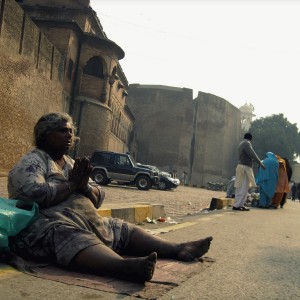‘The creation waits in eager expectation for the children of God to be revealed’ (Rom 8:19)
At the end of September, world leaders met in New York to adopt ‘The Global Goals’ affirming their commitment to a better world: free from poverty, with a restored environment, peace, and equality.
However, few leaders appear prepared to face up to the scale of change required to meet these ambitious targets. As Christians, are we interested? And are we prepared to step into the breach?
Significant advances
Over the last 25 years, humanity has made huge progress. The number of people living in extreme poverty has fallen by half,[1] the number of women dying in childbirth in key regions has fallen by two-thirds,[2] and we have passed important milestones in the fight against measles, malaria, HIV, and a host of tropical diseases.[3] The next generation now has vastly better prospects than in the past; for example, more children than ever have the chance to gain an education and girls in particular have seen steady improvements in access to schooling.[4] [5]
Overall, we have made some very significant advances, unprecedented in history.
Looming crisis
However, the job is not yet finished. A billion people, particularly women, remain mired in extreme poverty, many of them politically marginalised or found in the world’s conflict zones and failed states. Furthermore, those still struggling in poverty are most at-risk from further damage to planet Earth’s life support systems.
As humanity consumes more and more of the earth’s natural resources, we are placing ever greater stress on the ecosystems that support life. According to the Stockholm Resilience Centre, we have already crossed key risk thresholds in four areas essential to maintaining a safe environment (biosphere integrity, biogeochemical cycles, climate change, and land-system change).[6]
This dramatically increases the risk that ‘human activities could inadvertently drive the Earth System into a much less hospitable state, damaging efforts to reduce poverty and leading to a deterioration of human wellbeing in many parts of the world’.[7] Already, more than a billion people live in water basins where water use exceeds sustainable limits, and many of the world’s best-known rivers, such as the Colorado, Indus, and Yellow Rivers, no longer reach the sea.[8] As a result, churches and development practitioners around the world report that life is becoming harder for poor people, with for example, local reservoirs drying up in Brazil and increasingly erratic monsoon rains affecting farmers in Nepal.[9]
The 2012 Lausanne Consultation in Jamaica concluded that ‘we are faced with [an environmental] crisis that is pressing, urgent, and that must be resolved in our generation’.[10] In a recent paper for Tearfund, Alex Evans and I used the words of Charles Dickens to describe our present age: ‘It was the best of times, it was the worst of times, it was the age of wisdom, it was the age of foolishness, it was the epoch of belief, it was the epoch of incredulity, it was the season of Light, it was the season of Darkness.’[11]
Despite all that has been achieved in recent decades, if we continue on our current broad path, we run the risk of a collapse in planet Earth’s life support systems, bringing increased conflict, the fragmentation of communities, and the reversal of all that has been gained.
How does our theology help us?
Scripture presents us with a holistic vision for the whole of creation. The hope of the gospel goes deeper than our personal expectation of salvation and restoration with God in heaven after death: it is a hope in the restoration of all things. We believe, as Tom Wright has said, that we are called to become co-workers with God (1 Cor 3:9) in the renewal and restoration of all things (Matt 19:28), of which we ourselves, having been saved and made new in Christ (2 Cor 5:17), are a foretaste of what God wants to do for the entire creation.[12] We look forward to a time when a new heaven and a new earth are birthed out of the old (Rom 8; Rev 22), and in the meantime, we pray and live Your Kingdom Come.
As Chris Wright has said,
‘The Gospel is not just “me and my salvation”—a means by which I can go to heaven when I die . . . the Gospel is the whole story of what God has done to take the creation—which has been broken and fractured by sin and rebellion—and bring it into unity and wholeness and redemption in the Lord Jesus Christ.’[13]
In the beginning, we see a creation characterised by shalom, a word that means much more than peace, and incorporates ideas of wholeness, completeness, balance, healing, well-being, tranquillity, prosperity, security, and justice.[14] Shalom is broken because of human sin and rebellion, and it is restored through Jesus’ death and resurrection, but not yet fully revealed in the world. It is this restoration of shalom that we hope for and now work towards. In the closing words of the ancient Nicene Creed, ‘We look for . . . the life of the world to come’.
What does this mean in economic terms?
Evans and I argue that the Old Testament Jubilee system offers a glimpse of what the outworking of shalom might look like in economic terms. We call this the Restorative Economy. This is an economic model in which all of us are empowered to participate as creative producers rather than simply passive consumers, where we work with the grain of nature, following the initial purpose of Adam ‘to work the Garden of Eden and take care of it’ (Gen 2:15), and above all where we respect the image of God in other human beings.
Such an economy would have three key features:
 It would keep within environmental limits. Chris Wright has said: ‘The Jubilee laws of Israel regulated the Israelites’ ownership and use of the land so that it was sustainable and so that shalom might exist in the community.’[15] For example, every seventh year was a Sabbath year, a time of ‘solemn rest for the land’ (Lev 25:4) that allowed it to regain its fertility. Jubilees were about ‘sufficiency, recognition of limits, and the need for God’s creation to rest’.[16]
It would keep within environmental limits. Chris Wright has said: ‘The Jubilee laws of Israel regulated the Israelites’ ownership and use of the land so that it was sustainable and so that shalom might exist in the community.’[15] For example, every seventh year was a Sabbath year, a time of ‘solemn rest for the land’ (Lev 25:4) that allowed it to regain its fertility. Jubilees were about ‘sufficiency, recognition of limits, and the need for God’s creation to rest’.[16] It would safeguard everyone’s ability to meet their basic needs, including our central need for relationship. Weekly Sabbaths and one-in-seven Sabbath years, for example, ensured a nationally instituted rhythm of work and rest that allowed time for relationships and community.[17] Furthermore, it was forbidden for Israelites to profit from those living in poverty by putting up prices for basic goods or lending at high rates of interest. Farmers were instructed: ‘Do not reap to the very edges of your field . . . leave them for the poor’ (Lev 19:9-10), and a portion of the tithe was also directed to ‘foreigners, the fatherless, and widows’ (Deut 14:28, 29). Above all, if these rules were followed correctly, Deuteronomy asserts that ‘there need be no poor people among you’ (Deut 15:4).[18]
It would safeguard everyone’s ability to meet their basic needs, including our central need for relationship. Weekly Sabbaths and one-in-seven Sabbath years, for example, ensured a nationally instituted rhythm of work and rest that allowed time for relationships and community.[17] Furthermore, it was forbidden for Israelites to profit from those living in poverty by putting up prices for basic goods or lending at high rates of interest. Farmers were instructed: ‘Do not reap to the very edges of your field . . . leave them for the poor’ (Lev 19:9-10), and a portion of the tithe was also directed to ‘foreigners, the fatherless, and widows’ (Deut 14:28, 29). Above all, if these rules were followed correctly, Deuteronomy asserts that ‘there need be no poor people among you’ (Deut 15:4).[18] It would keep inequality within reasonable limits. Under the Jubilee system, land ownership was reset to its initial per capita distribution every 50 years.[19] In the agrarian context of the time, land was also the main store of wealth, and the land reset therefore functioned as a wealth reboot more generally, preventing wealth inequalities from building up over generations. This provided equality of opportunity. Every 50 years, each family would have an opportunity to start afresh—free of debt and in possession of their own land.[20]
It would keep inequality within reasonable limits. Under the Jubilee system, land ownership was reset to its initial per capita distribution every 50 years.[19] In the agrarian context of the time, land was also the main store of wealth, and the land reset therefore functioned as a wealth reboot more generally, preventing wealth inequalities from building up over generations. This provided equality of opportunity. Every 50 years, each family would have an opportunity to start afresh—free of debt and in possession of their own land.[20]
The Jubilee system offers a model for us today. While markets and trade are part of—and key to—reducing poverty, Jubilee principles ensure that human welfare and the wholeness of creation are not made subservient to these markets. We urgently need to find modern-day expressions of these principles in the way we operate as a society, and in the laws which govern our economy.
Change starts with us
How can we do this? Many of us already give money to organisations that are battling against poverty, or against environmental degradation, or inequality, and the abuse of power. However, overcoming these problems requires changes to our lifestyles as well as our money, and changes to the policies that our governments pursue.
The types of policy change required have been laid out clearly in a number of places.[21] However, the lesson of history is that convincing governments to make big systemic changes requires a broader shift in society’s values. In other words, change starts with us, and our lifestyles, and relies on the creation of a passionate movement for change, not just behind-the-scenes lobbying by professionals.
Faced with the scale of the challenges described above, our own individual actions can seem insignificant. However, the challenge we face today is little different from the challenge faced by those Christian campaigners who changed attitudes to slavery, civil rights, votes and education for women, debt forgiveness for poor countries, and many other issues.
Christians have excelled at making the moral case for change, because we have a rich set of values to draw on in Scripture. History teaches us that it is moral arguments that often persuade people to change their attitude. Slavery, child labour, debt forgiveness—all of these issues are now seen through a moral rather than economic lens.
So what can we do?
We can use our power as voters, citizens, and consumers. Politicians will respond if ‘a critical mass is vocal and visible in demonstrating higher values’.[22] Similarly, our consumption and investment decisions can exemplify the moral argument for change.
We can protest. In the past, Christians have been masters of prophetic protest and political theatre. In the US, Rev Martin Luther King and the civil rights movement had a bank of spectacular non-violent protest tactics such as sit-ins, boycotts, and freedom rides, anchored in the first point on members’ commitment cards: ‘meditate daily on the teachings and life of Jesus’.[23]
In 2000, the Jubilee campaign to cancel the unpayable debts of the world’s poorest countries used human chains surrounding G8 summits to symbolise chains of debt burdening poor communities. More cheekily, they rendered to Caesar what was Caesar’s by sending the UK Treasury £1 coins along with a message asking for debt cancellation, to help pay for cancelling the debt—causing consternation and a lot of work in the Treasury, followed by the debt cancellation they wanted.
We can change how we respond to poverty, brokenness, and environmental issues in our own lives. Thabo Makgoba notes that as long ago as 1978, the Anglican Communion’s Lambeth Conference issued a challenge to ‘renew [your] lifestyle and use of the world’s resources so that the service and wellbeing of the whole family comes before the enjoyment of over-indulgent forms of affluence.’ [24] In keeping with this, we can live more simply, staying within our fair share of the world’s resources, and we can respond to poverty with radical generosity.[25][26]
Finally, we can pray. Prayerful communities of disciples have throughout history had a much greater impact on society than they could have asked or imagined.
Today too, prayer, protest, and lifestyle change can accelerate change in government policy and give humanity a chance to meet the lofty ambitions of the Global Goals: ending global poverty, safeguarding our planet, and promoting peace and equality. This offers us a small glimpse of the ‘life of the world to come’ that we hope for.
If you want to find out more about Tearfund’s work helping make the Restorative Economy a reality, you can contact us at globalcampaign@tearfund.org.
Endnotes
- World Bank, ‘Report Card: The World Bank Group Twin Goals & The Millennium Development Goals’, Global Monitoring Report 2014/2015, http://www.worldbank.org/content/dam/Worldbank/gmr/gmr2014/GMR_2014_Report_Card.pdf, 17-18, accessed 29 January 2016.
- In Southern Asia, Eastern Asia, South East Asia, and North Africa. United Nations, Millennium Development Goals Report 2015, 38, accessed 26 August 2015.
- Ibid, 44.
- Ibid, 24, 27.
- Editor’s Note: See article entitled ‘Micah Challenge International: A voice of evangelical advocacy’ by Joel Edwards and Geoff Tunnicliffe in the March 2015 issue of Lausanne Global Analysis.
- Editor’s Note: See article entitled ‘Climate Change in Oceania: Ecomission and ecojustice’ by Mick Pope in the March 2015 issue of Lausanne Global Analysis.
- Steffen, W, et al, Planetary Boundaries 2.0 – new and improved, http://www.stockholmresilience.org/21/research/research-news/1-15-2015-planetary-boundaries-2.0—new-and-improved.html, 2015.
- National Geographic, 8 Mighty Rivers Run Dry from Overuse, http://environment.nationalgeographic.com/environment/photos/rivers-run-dry/#/freshwater-rivers-colorado-1_45140_600x450.jpg, accessed 6 August 2015.
- Alex Evans and Richard Gower, The Restorative Economy: Completing Our Unfinished Millennium Jubilee, 2015, http://www.tearfund.org/en/about_you/campaign/report/, 12-13, accessed 6 August 2015.
- Lausanne Global Consultation on Creation Care and the Gospel: Call to Action https://lausanne.org/content/statement/creation-care-call-to-action (accessed 6/8/15)
- Evans and Gower, The Restorative Economy, 11.
- Tom Wright, Surprised by Hope (London: SPCK, 2007), 210, 212-23.
- This quote by Dr Chris Wright of Langham Partnership International is transcribed from an interview by Tearfund, July 2014.
- N Spencer and R White, Christianity, Climate Change and Sustainable Living (London: Jubilee Centre and Faraday Institute, 2007), 115-116.
- Chris Wright, Mission of God’s People (Grand Rapids: Zondervan, 2010), 55.
- Evans and Gower, The Restorative Economy, 7.
- Michael Schluter and others have made a compelling case for the centrality of relationship to the Jubilee system. See http://www.jubilee-centre.org/relationism-pursuing-a-biblical-vision-for-society-by-michael-schluter/, accessed 6 August 2015.
- We see a reflection of this in the early church community in Acts 2-4, where, mirroring Deuteronomy 15, there was ‘no needy person among them’ (Acts 4:34), offering a glimpse of shalom when Christ returns.
- As Kim Tan explains, ‘When the Nation of Israel entered the Promised Land, the country was divided up in an equitable manner. The Territories were divided up in proportion to the size of the tribes.’ Kim Tan, The Jubilee Gospel, (United States: Authentic Media, 2009).
- Ibid.
- See chapter 4 for an introduction. Evans and Gower, The Restorative Economy.
- Ibid, 8.
- The Commitment Card, http://teachingamericanhistory.org/library/document/commitment-card/, accessed 26 August 2015.
- Quoted in Thabo Makgoba, Hope and the Environment: A Perspective From the Majority World (Anvil, 2013), 58.
- See for example S Rodin, ed, ‘Christ-Centered Generosity’ (Kingdom Life Publishing, 2015), https://kingdomlifepublishing.com/product/christ-centered-generosity/.
- Editor’s Note: See article entitled ‘Christian Generosity Trends and the Future of Christian Giving’ by Sas Conradie in the March 2013 issue of Lausanne Global Analysis.



